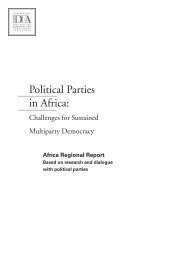Background Document - Danish Institute for Parties and Democracy
Background Document - Danish Institute for Parties and Democracy
Background Document - Danish Institute for Parties and Democracy
You also want an ePaper? Increase the reach of your titles
YUMPU automatically turns print PDFs into web optimized ePapers that Google loves.
en<strong>for</strong>cing these norms in ways that affect their self-confidence, limiting their access<br />
to in<strong>for</strong>mation <strong>and</strong> skills <strong>and</strong> rein<strong>for</strong>cing their lower status. The following section<br />
deals with this.<br />
BARRIERS TO PARTICIPATION OF WOMEN IN LOCAL POLITICS<br />
Some of the institutional <strong>and</strong> structural barriers to women’s participation in local<br />
politics can be identified as follows:<br />
´ Entrenched sexual division of labour within the households <strong>and</strong> outside: While in many<br />
parts of the world such as South Asia women do enjoy constitutional rights their actual<br />
roles are still closely tied to their reproductive <strong>and</strong> household functions. This makes<br />
it difficult <strong>for</strong> them to find time <strong>for</strong> politics. Closely tied to these sexual divisions of<br />
labour are associated cultural <strong>and</strong> traditional norms that entrench these even further.<br />
´ Low indices on the human development index <strong>for</strong> women: Demographic statistics in<br />
South Asia <strong>and</strong> Africa <strong>for</strong> instance indicate low literacy rates, poor health <strong>and</strong> poverty<br />
particularly <strong>for</strong> women that points to a lack of basic rights to education, health care,<br />
safety <strong>and</strong> employment opportunities.<br />
´ Discrimination: Women often face discrimination in practice when st<strong>and</strong>ing <strong>for</strong> office<br />
to local government positions even if laws are in their favour. Attitudes that put policies<br />
<strong>and</strong> decision making into the male preserve see women as incapable of management<br />
<strong>and</strong> governance roles.<br />
´ Institutional cultures within political institutions at all levels including local ones are<br />
not favourable to women as they often have styles <strong>and</strong> modes of working that are<br />
unacceptable to them. The male dominated environment within the institution can<br />
limit the extent to which women can bring <strong>for</strong>ward issues relevant <strong>for</strong> women <strong>and</strong> ones<br />
related to social justice. Some also find that society <strong>and</strong> colleagues have unrealistic<br />
st<strong>and</strong>ards <strong>and</strong> expectations <strong>for</strong> them.<br />
´ The culture: Women are not prepared to be involved in political environments which<br />
support an aggressive culture, combative debate <strong>and</strong> personality conflicts as well as<br />
male; colleagues who have difficulty coping with women <strong>and</strong> so belittle <strong>and</strong> personally<br />
attack them. The increasing corruption in politics is another disincentive.<br />
´ Campaign expenses can be prohibitive <strong>for</strong> women who are also active in the unpaid<br />
care economy <strong>and</strong> earn less than men in the labour market. Once elected they have to<br />
superimpose their new duties on their already existing ones in the home – the lack of<br />
child care support <strong>and</strong> timings of the meetings have also been a problem.<br />
´ The provision of quotas <strong>for</strong> women in local government has not necessarily created a<br />
culture open to facilitating the participation of women though it may have facilitated<br />
their initial entry into the system. In some cases reserved seats are decided through<br />
indirect elections <strong>and</strong> women have little autonomy. Sometimes women are nominated<br />
rather than elected from reserved seats – this creates a system of patronage that can<br />
prevent them assuming independent positions of leadership. Even when they are elected<br />
from reserved seats <strong>and</strong> not nominated the reserved seats are seen as having an<br />
inferior status. Considerable training <strong>and</strong> support is needed to assist women to learn<br />
the way the political environment works <strong>and</strong> fulfil their roles.<br />
´ Dependence on support through kinship <strong>and</strong> family: For women without family connections<br />
barriers to participation remain <strong>and</strong> even when they enter the system the pres-<br />
WOMEN IN POLITICS DANISH INSTITUTE FOR PARTIES AND DEMOCRACY PAGE 29
















